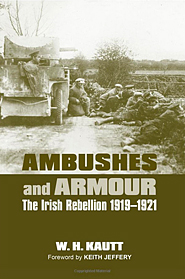
The recent wars in Afghanistan and Iraq have focused public attention on ambushes, but this is not a new problem. The Irish Revolution (1916-1923) was a war of 'firsts': the first British counter-insurgency after World War I; the first mass use of motorized vehicles for counter-insurgency; the first use of extensive counter-mobility operations by insurgents; the first time a military force had to 'up-armor' its motor vehicles in response to the insurgent threat; the first time they had to deal with the negative effects of hanging steel plate on cars and trucks; the use of improvised explosive devices (IEDs) against motor vehicles - in both forms of pressure detonation and command (electric) detonation; the first time an army had to develop doctrine for the use of motor vehicles in a tactical or combat mode. Thus, the IRA exploited the axiom that military forces are at their most vulnerable when on the move. In this book, author W.H. Kautt looks at the development of ambush and counter-ambush doctrine during the Irish rebellion. By disregarding the politics and social issues, as much as possible without losing context and perspective, the focus is on the military aspects of these operations. Further, the examination of the tactics, rather than the strategies, reveals how the opposing forces functioned 'on the ground.' Soldiers on both sides did not fight according to policies or the stances of politicians, they fought to defeat their enemies and to stay alive. Since the conflict served as a model for both later revolutions, as well as counter-insurgent operations, this study - now available in paperback - offers insight into how ambush and counter-ambush operations developed.
W. H. KAUTT received his Ph.D in Modern History from the University of Ulster at Jordanstown. He is an Associate Professor of Military History at the U.S. Army Command and General Staff College and previously served as a U.S. Air Force officer. He is a Fellow of the Royal Historical Society.
His research interests include, in addition to modern Ireland, unconventional and guerrilla warfare, terrorism, countermobility operations; arms smuggling; intelligence; medieval military history, especially the Crusades, the Military Orders, the Order of Malta in particular; and early modern history.